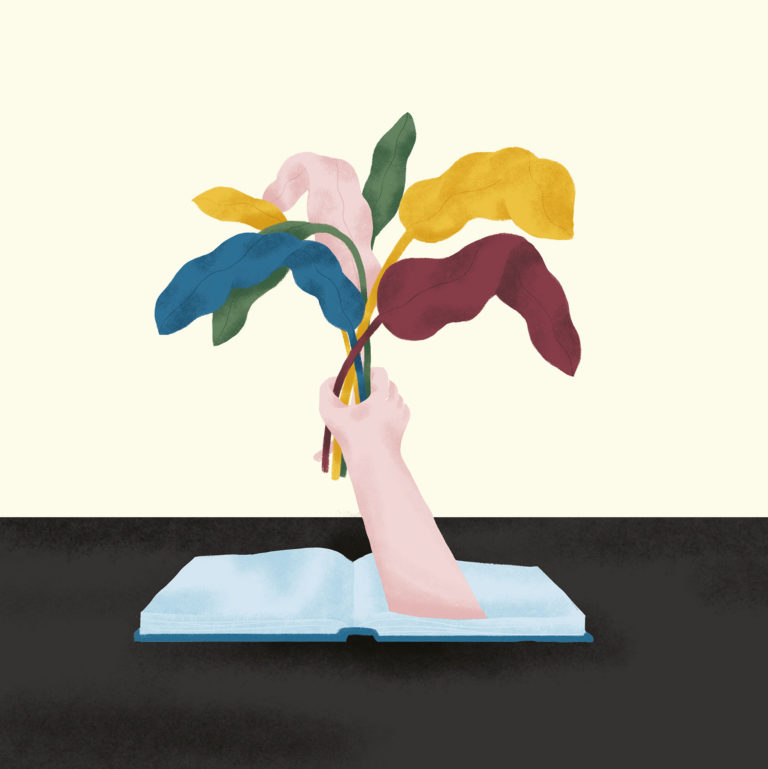Who are we to be with one another? And how are we to be with one another?
Pádraig Ó Tuama

In the words of David Whyte, “Poetry is language against which you have no defenses.”
Illustration by Elise Vanderplanke.
Who are we to be with one another? And how are we to be with one another?
Pádraig Ó Tuama
The poet Jericho Brown reminds us to bear witness to the complexity of the human experience, to interrogate the proximity of violence to love, and to look and listen closer so that we might uncover the small truths and surprises in life. His presence is irreverent and magnetic, as the high school students who joined us for this conversation experienced firsthand at the 2018 Geraldine R. Dodge Poetry Festival. And now he’s won the 2020 Pulitzer Prize for Poetry.
Editor’s note: This interview discusses sexual violence and rape.
The late poet Mary Oliver is among the most beloved writers of modern times. Amidst the harshness of life, she found redemption in the natural world and in beautiful, precise language. She won the Pulitzer Prize and the National Book Award among her many honors — and published numerous collections of poetry and also some wonderful prose. Krista met with her in 2015 for this rare, intimate conversation. We offer it up anew, as nourishment.
Layli Long Soldier is a writer, a mother, a citizen of the United States, and a citizen of the Oglala Lakota Nation. She has a way of opening up this part of her life, and of American life, to inspire self-searching and tenderness. Her award-winning first book of poetry, WHEREAS, is a response to the U.S. government’s official apology to Native peoples in 2009, which was done so quietly, with no ceremony, that it was practically a secret. Layli Long Soldier offers entry points for us all — to events that are not merely about the past, and to the freedom real apologies might bring.
Poetry is language against which you have no defenses.
David Whyte
December 12, 2024
The delightful Nikki Giovanni died on Dec. 9. It is a joy and a solace to relisten to this beloved conversation she had with Krista in 2016 – to experience her signature mix of high seriousness, sweeping perspective, and insistent pleasure. Her words and her spirit feel, if anything, more necessary now. In the 1960s, she was a poet of the Black Arts Movement that nourished civil rights. She became a professor at Virginia Tech, where she called forth beauty and courage after the 2007 shooting there — a precursor to violence that has become all too familiar in American life in the intervening years. And she was an adored voice to a new generation — an enthusiastic elder to all — at home in her body and in the world, even while she saw and exulted in the beyond of this tumultuous age of her lifetime.
A Buddhist philosopher of ecology, Joanna Macy says we are at a pivotal moment in history with the possibility to unravel or create a life-sustaining human society. Now entering her 90s, Macy has lived adventurously by any definition. She worked with the CIA in Cold War Europe and the Peace Corps in post-colonial India and was an early environmental activist. She brings a poetic and spiritual sensibility to her work that’s reflected in her translations of the early-20th-century poet Rainer Maria Rilke. We take that poetry as a lens on her wisdom on the great dramas of our time: ecological, political, personal.
When despair for the world grows in me
and I wake in the night at the least sound
in fear of what my life and my children’s lives may be,
I go and lie down where the wood drake
rests in his beauty on the water, and the great heron feeds.
I come into the peace of wild things
who do not tax their lives with forethought
of grief. I come into the presence of still water.
And I feel above me the day-blind stars
waiting with their light. For a time
I rest in the grace of the world, and am free.
© Wendell Berry. This poem is excerpted from The Selected Poems of Wendell Berry and is reprinted with permission of the author and Counterpoint Press.
Watch a poetry film version of this on our YouTube channel.
Search results for “”
Filters
/